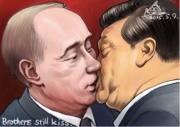(Thread IKs:
dead gay comedy forums)
|
has anybody read "Revolution of the mind: higher learning amongst the Bolsheviks" by Michael David-Fox fitzpatrick cited it in Everyday Stalinism, caught my eye in the endnotes
|
|
|
|

|
| # ? May 20, 2024 15:50 |
my dad posted:To participate in the derail a bit, a Chinese photographer, Xiao Yang, made a series of photographs of Yugoslavia's brutalist monuments and architecture. good article on spomeniks https://www.calvertjournal.com/articles/show/7269/spomenik-yugoslav-monument-owen-hatherley quote:There was no specific call or commission by Tito or the Yugoslav government for monumental sculptures, nor for abstract ones, nor were they all Second World War memorials as such. The sculptures that Kempenaers photographed – and which have since gone into circulation as abstracted images – commemorate a variety of different events. “Spomenik #2 (Petrova Gora)”, of a curved, metal sculpture with several pieces missing, is the “Monument to the uprising of the people of Kordun and Banija”, designed by Vojin Bakic and finished in 1981. It stands on the site where 300 barely armed local peasants were killed fighting against the ferociously violent fascist Ustaše militia in 1942. “Spomenik #5 (Kruševo)”, a bulbous white concrete structure with a walkway through the middle, is the Ilinden Monument in Macedonia, which is dedicated both to the Ilinden Uprising of 1903 against the Ottoman Empire (it contains the remains of one of its leaders) and to local partisan battles in 1941-44; it was designed by Iskra Grabuloska and Jordan Grabuloski in 1974. “Spomenik #6 (Kozara)”, a twisting, tubular concrete sculpture designed by Dusan Džamonja in 1969, is the Monument to the Revolution in Mrakovica, Bosnia-Herzegovina, and is specifically dedicated to the Partisans and civilians – around 70,000 – killed or deported to concentration camps in the area in June and July 1942.
|
|
|
|
|
AnimeIsTrash posted:There are a good deal of people who's idea of leftism is just them owning a small farm somewhere in the middle of bumfuck nowhere. american myth of the yeoman farmer dies hard
|
|
|
|
my dad posted:To participate in the derail a bit, a Chinese photographer, Xiao Yang, made a series of photographs of Yugoslavia's brutalist monuments and architecture.
|
|
|
|
Fish of hemp posted:I mean, why do all communist movements dream about concrete cubes and drab clothing? What's wrong with nice clothes and wooden buildings? https://www.russianfashionblog.com/index.php/2013/06/constructivism-russia-1920s/\ You believe propaganda comrade
|
|
|
|
Thierry Mugler died recently. Some striking photos from his USSR visit: https://twitter.com/kazbek/status/1486377575207288836?s=20&t=qmqP-U8KgcrxQhZyf7V6bw
|
|
|
|
Virtual Russian posted:https://www.russianfashionblog.com/index.php/2013/06/constructivism-russia-1920s/\ I follow the internet discussions of the communists of 2020's. And they dream about concrete cubes and drab clothing.
|
|
|
|
strange feelings re Daisy posted:Thierry Mugler died recently. Some striking photos from his USSR visit: (unironically) this is what they took from us
|
|
|
|
quote:As Marxism-Leninism-Maoism has taught us: social investigation and class analysis.
|
|
|
|
You can tell I'm a marxist because I reject and ignore the marxist definition of fascism as I side with the neoliberals.
|
|
|
|
"The Electoral Left." Oh you mean PSL? 
|
|
|
|
what
|
|
|
|
|
|
|
|
https://twitter.com/MoodyKnowsNada/status/1487131690749333508?cxt=HHwWiMC4lZiZraMpAAAA
|
|
|
|
Falstaff posted:You can tell I'm a marxist because I reject and ignore the marxist definition of fascism as I side with the neoliberals. I thought the last five years (to say nothing of the last two) had made me as jaded as I'll ever be but I'm still shocked at how bitter I feel over how quickly the Philippine left has decided to throw in its lot with the liberals for the sake of trying to defeat Marcos. While crafting all of these high-minded rationalizations for doing so. I feel sick.
|
|
|
|
gradenko_2000 posted:I thought the last five years (to say nothing of the last two) had made me as jaded as I'll ever be but I'm still shocked at how bitter I feel over how quickly the Philippine left has decided to throw in its lot with the liberals for the sake of trying to defeat Marcos. That sucks, dude. I'm sorry.  This is what makes me so hostile to figures like Vaush, who only ever engage with the material on a surface level but present themselves as experts. They might invoke the terminology, but never the ideas signified by that terminology. At best you'll get some deceptive quote-mining to present statements out of context, which gives the appearance of authority, but which actually betrays their ignorance on the subject. Unfortunately, that sort of thing is very persuasive to the less educated, particularly when the conclusions presented suggest actions reinforced by mainstream media (e.g., vote blue no matter who). But I guess I'm just preaching to the choir here. So, to reiterate: that sucks, dude. Sorry.
|
|
|
|
gradenko_2000 posted:I thought the last five years (to say nothing of the last two) had made me as jaded as I'll ever be but I'm still shocked at how bitter I feel over how quickly the Philippine left has decided to throw in its lot with the liberals for the sake of trying to defeat Marcos. i thought you were just quoting something from DnD or reddit. it reads word for word the kind of poo poo American leftists say about our elections.
|
|
|
|
Pener Kropoopkin posted:i thought you were just quoting something from DnD or reddit. it reads word for word the kind of poo poo American leftists say about our elections. 
|
|
|
|
Mafic Rhyolite posted:Has anyone come up with a new symbol as good as the hammer and sickle was a hundred years ago? It was a banger when it dropped but nobody knows what the gently caress a sickle even is anymore and you can't really put modern farming equipment on a flag. I've got one https://twitter.com/Pretiblkunicorn/status/1487460966866509827?s=20&t=NRViIdK4_dfFjz8PEFIqaw
|
|
|
|
Cornets and Consilience by Niles Eldredge The millennium draws nigh, and, predictably, the silly season has already begun. I am thinking, though, not of the "end is near" types, but rather of the prophecies of an increasingly strident group of gene-entranced evolutionary biologists who insist that everything human—our bodies, our behaviors, our cultural norms—devolves down to the competitive propensities of our genes to represent themselves in the coming generation. So we find "evolutionary psychologists" like Stephen Pinker telling us that it matters not to the end result how parents rear their children—even though everyone who has ever been a kid knows otherwise. And Richard Dawkins, of "selfish gene" fame, recently appeared in a BBC Horizon film, Darwin's Legacy, telling his viewers that Hitler gave eugenics a bad name. (Though his face held the trace of a sly smile, Dawkins appeared to be serious.) These themes, of course, are not new. Evolutionary biologists have been looking anxiously over their shoulders since the '50s and '60s, when the triumphs of molecular biology began rapidly accumulating. Back then, the Nobel aura of DNA and RNA clearly threatened to take center stage away from the traditional and far less sexy field of population genetics, where mathematically trained geneticists had for decades been specifying the fates of genes in groups of organisms under various experimental, field, and purely theoretical conditions. Thus evolutionary rhetoric—epitomized by Dawkins's selfish genes, but fashioned into a virtual academic industry with the rise of sociobiology in the 1970s—was forced to confront and somehow embrace the new genetic knowledge. Sociobiologists did so by inventing a brilliant, if skewed, theory that described the biological world as an epiphenomenon of a mad race between genes jockeying for position in the world. The American playwright Robert Ardrey actually got the ball rolling in 1961, when, in his African Genesis, he reinterpreted paleoanthropologist Raymond Dart's analysis of the cultural and physical remains of the three-million-year-old species Australopithecus africanus as proof of our killer instincts: We murder and wage war, Ardrey believed, because our ancestors did—and such propensities live on in our genes. Likewise, we have been hearing for years that the male desire to rape and philander is purely a vestige of the ineluctable urge to leave as many offspring as possible to the next generation—an urge, of course, that itself reduces to our genes' desire to survive long after we ourselves are dead. But the most recent hype has centered around the latest book by a man I generally admire very much: Edward O. Wilson. The "father" of sociobiology, Wilson has contributed much to such disparate fields as biogeography, systematics and ecology. My admiration for him stems especially from his diligent passion as a Paul Revere-like spokesman for the earth's vanishing ecosystems and species. It is thus with something of a heavy heart I confront Wilson's "consilience." Wilson, of course, is well known for his ontological claim that in every conceivable sense and aspect of their being, humans are epiphenomena of the competitive behavior of their genes. What is new with his consilience is the epistemological claim that all ways of knowing the human condition—not just physiology and psychology, but philosophy (especially ethics), theology, economics… indeed, the entire gamut of what we traditionally call "social sciences" and "the humanities"—are in a real and formal sense inadequate insofar as they have not been "reduced"—distilled—to the deeper truths of the genetic shell game. Consilience, Wilson tells us, means "jumping together"—and his ostensible task is to integrate biology with the humanities to form some grand new synthesis. But in several recent interviews I have seen, Wilson readily admits that what he really has in mind is something quite different: the "reduction" of the humanistic fields into the ontology of evolutionary genetics. The word "consilience" seems an odd choice—not least for its haunting similarity to a favorite word of one of Wilson's chief rivals at Harvard. Stephen Jay Gould uses "conflation" to mean the inappropriate juxtaposition of concepts. Conflation, in essence, means "confusion." So, to my mind, does Wilson's "consilience." What to make of this word "reduce"? What does it really mean to "reduce" one area of human thought into another? Wilson, for example, claims that human ethical systems do not derive from philosophical first principles, but instead reflect the evolutionary status of human beings as social organisms who simply need sets of rules to get along—and to enable them to leave their genes behind before they die. That both the positive and the negative interactions among social organisms are in part heritable should come to none of us as a complete surprise. We humans have known seemingly forever that we are a form of animal life—albeit a peculiar form whose approach to the exigencies of life has become heavily shaped by something called "culture." So what I find (so) disturbing about Wilson's thesis is not really the ontological claim that evolutionary biological history—as determined by our genes—has something to do with the human condition. Rape and philandering may indeed have less to do with making babies than with the expression of symbolic issues of power in males—but that simply means that nature does not completely override nurture. It does not follow, though, that there is no biological component at all to human behavior. Rather, it is the epistemological side of Wilson's consilience gambit that strikes me as almost incomprehensibly silly. The philosopher Ernest Nagel was known for his formal analysis of "reduction" in the sciences. According to Nagel, any exercise in reduction must involve a formal translation of the language of one field into that of another: of chemistry, say, into physics. To reduce the description of a chemical reaction to pure physics would entail describing, say, the equation "2 H2 + O2 = 2 H2O" purely in terms of electrons, protons and neutrons. There's nothing wrong with this enterprise in principle—except that what we're left with doesn't tell us anything about either the quantitative or qualitative properties of water molecules. Moreover, why stop at electrons, protons and neutrons, since they themselves are composed of smaller bits of interactive matter? Complex systems clearly do exist. They clearly have properties of their own—properties that intrinsically cannot be addressed by the reductionist enterprise no matter how clever. Richard Dawkins, for example, has claimed that ecosystems will ultimately be understood in terms of competition among genes. Ecologists, in contrast, seem distinctly underwhelmed by this prospect, preferring to describe such systems in terms of patterns of matter—energy flow among local populations of microbes, fungi, plants, animals—and in terms of their physical location. Sure, fungal species have evolved physiological adaptations for the adsorption of various forms of dead organic material. But the basic fact that there is an evolutionary history to all of an ecosystem's adaptations is of no direct, immediate relevance to the task of specifying what those internal dynamics are. It is only trivially true that information stored in the genes of each of an ecosystem's organisms underlies those organisms' anatomies and physiologies; there is simply no meaningful way to describe the ecosystem itself through a translation into the genetic "language" of its component organisms. And so this business of "consilience"—Wilson's raid on the humanities. What, for example, can the evolutionary history of the human gene have to do with human culture? I am writing these thoughts in a room that is bedecked with the best examples from my extensive collection of Victorian and Edwardian cornets. I collect these horns for a variety of reasons, some deeply personal—every time I find one at a flea market, for example, I experience once again the thrill of getting my first horn in grammar school. Other reasons are more analytic: Cornets were invented, and their designs had "evolutionary" histories. They became virtually extinct when radios were invented—all but killing town bands—and when Louis Armstrong switched to the more brilliant sound of the trumpet. So, in my array of cornets I see intriguing parallels with my professional career as an evolutionary-minded paleontologist. My cornets can also be reduced to their value as investments. And then there is the rich emotional enjoyment of making music with my friends on these dear old things. Am I, like every other organism on the face of the earth, leading an "economic" existence? Meaning, do I do the sorts of things required in our society to make a living, to provide bread for the table to sustain not only my own body but those of my immediate family as well? Sure. Is caring for my children going to help some of my genes make it to the next generation? Sure—possibly. But has the emotional and economic well- being that I can directly identify with my cornet-collecting mania become any the more explicable by acknowledging that I am a living primate mammal who eats and has already reproduced? I don't think so. Economics—an impenetrable maze to me—is the description and analysis of complex systems, subsets of our social organization. Do we compete in the marketplace because, at base, we are animals that need to eat? Sure. Is knowing something about genes going to help economists understand their systems? Wilson sure thinks so—yet in a recent issue of Structural Change and Economic Dynamics devoted to evolutionary models in economic theory, the point was repeatedly made that evolution's relation to economics depends very much on which version of evolutionary theory is chosen. Theories of evolution that try to get by with reducing the process simply to natural selection generation by generation ignore the nature and internal dynamics of large-scale biological systems. Indeed, such notions ignore the very existence of such systems. In contrast, I am of the firm opinion that the course of evolutionary history is changed only when ecosystems are disrupted by physical causes: The greater the destructive event—the global mass extinctions of the geological past, as when the dinosaurs and many other forms of life disappeared abruptly more than 65 million years ago, for example—the greater the eventual evolutionary response. No perturbation, no evolution. My evolutionary worldview is thus very different from those of Wilson and Dawkins. I take seriously the existence of large-scale systems. Though smaller-scale systems with their own internal dynamics (like natural selection working within populations) do exist as component parts of larger-scale systems, the internal dynamics of the smaller-scale components never yield a usable description of the nature of the larger-scale systems. On the other hand, if we pursue this reductionistic bent, why stop at the level of the gene? Why not reduce all evolutionary biology to chemistry, and then down to physics? When we can describe ecosystems and species in terms of quarks and leptons, we will have the ultimate reductio ad absurdum! I simply cannot take the epistemological side of consilience seriously at all. And I shudder when I hear Darwin's beautiful and simple idea of natural selection mangled when it is applied simplistically as a moral of how we do and should behave. I feel the same way when I read the gentlemanly E. O. Wilson admonishing us to recast our ethical systems in light of his version of evolutionary biology. He is really not so very far away from the darker side—as when Richard Dawkins tells us on television that Hitler gave eugenics a bad name.
|
|
|
|
Algund Eenboom posted:I experience once again the thrill of getting my first horn in grammar school. good post, gould could beat up wilson in a fistfight
|
|
|
|
Fish of hemp posted:internet discussions of the communists Well there's your problem. But really, I know a ton of actual communists that don't want a drab boring world. Communism would liberate aesthetics from the yoke of the market. Drab mass produced clothing makes sense in a developing economy that needs to cloth all. However in an advanced automated economy we'd all be free to peruse our own artisan-like dreams. Everyone would have the time to make things that are both beautiful and useful.
|
|
|
|
as a materialist, historical or otherwise, you have to countance the fact that material reductionism is real and true and good. dawkins and pinker are poising the well against a central tenet not just of marxism but of science. that is some high liberal 4th dimensional chess. while eldredge is pretty much right on, I worry he might likewise be throwing the reductionism baby out with the bathwater because it got hard coopted by nazi shitheads who want to rationalize their crimes with a bogus inference that because all of reality boils down to physics, the development of the human species boils down to something they're smart enough to understand and manipulate
|
|
|
|
https://www.internationalmagz.com/articles/trains-against-capitalismquote:Trains Against Capitalism posting this article to say that trains are good and communist
|
|
|
|
Danann posted:https://www.internationalmagz.com/articles/trains-against-capitalism one too many letters for me to read, apologies.
|
|
|
|
SSJ_naruto_2003 posted:Essential writings (preferably easy to read) for someone who believes in communism basically but hasn't read the theory? Some easily accessible PDF:s Marxism-Leninism-Maoism - Basic Course Put together by the Communist Party of India (Maoist) and used in political education. Not particularly in-depth but a pretty easy read. Basic Principles of Marxism-Leninism - A Primer by Jose Maria Sison Haven't read this myself, but have heard good things about it. Apparently used as a study guide by the Communist Part of the Philippines. This site that hosts the PDF:s also sells printed copies and has a bunch of the old ML classics available for free in PDF format.
|
|
|
|
Virtual Russian posted:Well there's your problem. I want a drab boring world due to photosensitivity. Turn the brightness down on the revolution, thanks.
|
|
|
|
Danann posted:https://www.internationalmagz.com/articles/trains-against-capitalism but have you thought about the demise of slow train rides 🚂 🪦 
|
|
|
|
Virtual Russian posted:Well there's your problem. 
|
|
|
|
The Voice of Labor posted:as a materialist, historical or otherwise, you have to countance the fact that material reductionism is real and true and good. dawkins and pinker are poising the well against a central tenet not just of marxism but of science. that is some high liberal 4th dimensional chess. while eldredge is pretty much right on, I worry he might likewise be throwing the reductionism baby out with the bathwater because it got hard coopted by nazi shitheads who want to rationalize their crimes with a bogus inference that because all of reality boils down to physics, the development of the human species boils down to something they're smart enough to understand and manipulate Hmm, no.
|
|
|
|
Algund Eenboom posted:Cornets and Consilience didn't read lol
|
|
|
|
Algund Eenboom posted:Cornets and Consilience tldr: What does evolutionary biology have to tell us about human society? Nothing, that's what.
|
|
|
|
then the third panel is post-soviet union where the guy's son has trained his entire life and now his orchestra, struggling to survive, is under 99 year contract by blizzard entertainment to play the orc theme from World of Warcraft forever
|
|
|
|
Fat-Lip-Sum-41.mp3 posted:tldr: What does evolutionary biology have to tell us about human society? Nothing, that's what. Turns out that the only inheretable trait that determines social success is wealth, and that incentivizes inbreeding while causing "good" traits like intelligence to no longer determine reproductive success. Therefore, those who are most "fit" for survival within human social environments are the actually the most genetically inferior group: billionaire heirs and royalty.
|
|
|
|
Algund Eenboom posted:Hmm, no. lol yeah sorry. the world is cold and mechanical, rule governed and tractable. super structure is ephimeral over base. the soul and freewill are infantile superstitions
|
|
|
The Voice of Labor posted:as a materialist, historical or otherwise, you have to countance the fact that material reductionism is real and true and good. dawkins and pinker are poising the well against a central tenet not just of marxism but of science. that is some high liberal 4th dimensional chess. while eldredge is pretty much right on, I worry he might likewise be throwing the reductionism baby out with the bathwater because it got hard coopted by nazi shitheads who want to rationalize their crimes with a bogus inference that because all of reality boils down to physics, the development of the human species boils down to something they're smart enough to understand and manipulate false.
|
|
|
|
|
The Voice of Labor posted:lol yeah sorry. the world is cold and mechanical, rule governed and tractable. super structure is ephimeral over base. the soul and freewill are infantile superstitions lol dipshit nihilism
|
|
|
|
Southpaugh posted:lol dipshit nihilism I don't think you know what nihilsm means let alone dipshit
|
|
|
|
"Free will isn't real" has been the rationale of nihilists for generations. You haven't struck upon anything interesting or profound here.
|
|
|
|

|
| # ? May 20, 2024 15:50 |
|
Men make their own history, b- erm, sorry Karl. gonna stop u right there,
|
|
|
































